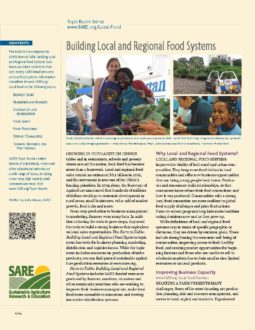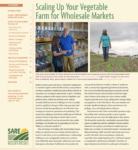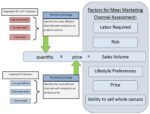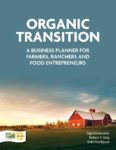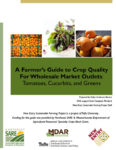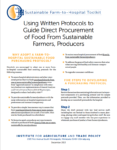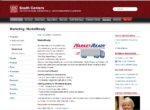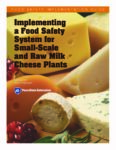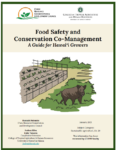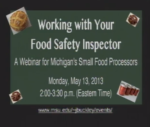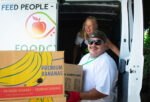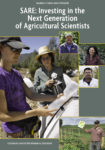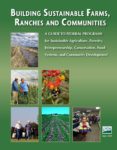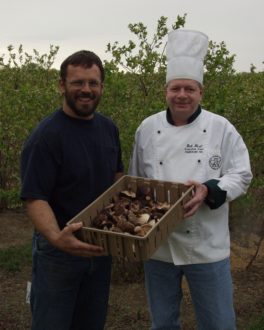
Discover a wealth of educational materials for farmers, ranchers, ag professionals, community organizers and others who are striving to reconfigure the nation's food system so more value stays in food-producing communities.
A condensed version of the content on this page is available as a topic brief (PDF download), Building Local and Regional Food Systems. Use the green Order button on this page to order free hard copies.
Growing in popularity on dinner tables and in restaurants, food banks, schools and grocery stores around the nation, local food has become more than a buzzword. Local and regional food sales totaled an estimated $6.1 billion in 2012, and the movement is now one of the USDA’s funding priorities: In 2014 alone, the Secretary of Agriculture announced that hundreds of millions of dollars would go to economic development in rural areas, small businesses, value-added market growth, food hubs and more.
From crop production to business management to marketing, farmers wear many hats. In addition to having the tools to grow crops, they need the tools to build a strong business that capitalizes on local sales opportunities. On this page we offer such tools—resources produced by farmers, ranchers, educators and other community members who are working to make local food more accessible to consumers.
Why Local and Regional Food Systems?
Local and regional food systems improve the vitality of communities in many ways, both rural and urban. They keep more food dollars in local communities and, in rural areas, offer new business opportunities that have the power to bring young people back home. More consumers are buying local out of a renewed interest to know where their food comes from and how it was produced. And farm to school programs, part of local food systems, aim to help kids make healthier food-purchasing decisions as they grow up.
Improving Business Capacity
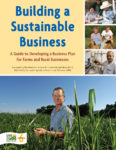
Whether you are a beginning farmer or have been in the field for years, use SARE’s manual, Building a Sustainable Business (free download), for developing and writing a business plan.
Starting a farm presents many challenges, and in fact the number of beginning farmers dropped 20 percent from 2007 to 2012, according to the U.S. Census of Agriculture. The learning curve is steep, so reliable information—on production planning, risk and resource management, and accessing land, capital and markets—is critical to their success. Websites, such as the Vermont’s New Farmer Project created through a SARE Grant, serve as popular clearinghouses of general and state-specific information. Experienced farmers as well as beginners often need access to capital and financing if they plan to expand their farm business or buy new equipment in pursuit of new opportunities. Here's one example of how a SARE grantee found a way to help lenders overcome their perception of farmers as a risky investment. Other grantees offer guidance on how farmers and ranchers can obtain funding from alternative sources, rather than traditional banks.
Land has become a surprisingly limited resource. Urban sprawl continues to exert upward pressure on land prices, making land access difficult for a farmer. As a result, farmers are looking for new, creative ways to access farmland, oftentimes by connecting with other farmers, local agencies and organizations, or landowners in their community.
Accessing Markets and Marketing

Oregon farmer Scottie Jones used a SARE grant to create FarmStay, an interactive website that connects people looking for a place to stay with farms that offer lodging. This type of tourism is known as agritourism—in addition to accommodations, farms can provide educational and recreational experiences that expose community members to agriculture. Agritourism generates additional revenue and diversifies operations, which helps reduce the risk of farming. Beyond basic business planning, marketing—figuring out the most profitable way to sell a product—can be another serious challenge for busy farmers and ranchers. With increasing demand for local food, today’s producers are finding innovative ways to access new and existing markets.
A marketing plan includes figuring out which consumers will be interested in your product, how many there are and how to reach them—all of which are important components of a profitable business. Part of marketing is advertising the product and setting the brand apart from competitors. Many producers have done this by sharing their farm story, which provides a personal touch for consumers who are far removed from food production and satisfies their desire to know the origin of what they eat.
Farmers sell their products directly to the consumer at farmers’ markets, and via community-supported agriculture (CSA) and pick-your-own programs. Others use an intermediary or middleman, such as cooperatives, food hubs, retailers, restaurants and schools, to help them distribute their produce locally. As a risk management strategy, farmers and ranchers often use multiple sales routes.
Building a local food system is not easy. Consumers must demand locally sourced products, communities must work together to establish the infrastructure needed to support a local system, and farmers must listen to and work with distributors, consumers and each other. See examples of case studies and assessments conducted by community stakeholders in Georgia, South Carolina, Oregon, North Carolina, New Hampshire and Iowa who are working to create a cohesive regional food system. These assessments can serve as examples and, used alongside the Community-Based Food System Assessment and Planning Guide, will help communities start planning their local food system.
Farm to Table Video: Direct Marketing for Farmers and Ranchers
Distribution and Aggregation
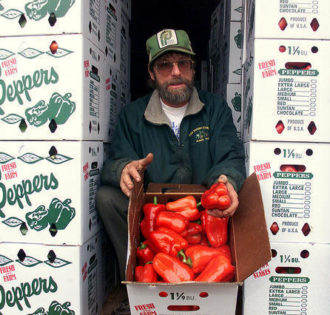
There are many ways for farmers to get their products to local consumers. Farmers choose their outlets depending on what they grow, their location, and time and labor available. Some distribution channels include the aggregation of products from multiple farms, which provides the volume and consistency needed to reach larger markets. Typical distribution methods, all of which allow farmers to communicate their identity and production values to consumers, include: Cooperatives—Businesses owned and run by a group of farmers who work together to market, aggregate and sell their products. Community Supported Agriculture (CSA)—Community members pay a produce subscription fee before the season starts, allowing the farmer to share risk with the consumer. Farmers’ Markets—Physical markets where farmers can rent a stall and sell their produce directly to the consumer. Food Hubs—A centrally located business that coordinates the aggregation, storage, processing, distribution and marketing of local and regional food products.
Farm to School/Institution/Retail—Farmers and ranchers can sell wholesale directly to non-commercial and commercial outlets such as schools, grocery stores, restaurants and hospitals. Producers often partner with a cooperative or food hub to provide the quantity and consistency that such institutions require.
What are the components of a farm to school program?

A farm to school program must include at least one of the following three practices: a school garden, produce supplied from a local farm or agricultural education. According to the National Farm to School Network, 44 percent of U.S. schools have a farm to school program. This number has skyrocketed over the last decade, driven by a desire to get more fresh fruits and vegetables into school lunches and improve kids’ eating habits. Farm to School includes local-food purchasing guides for school lunch programs, toolkits that help train school kitchen staff to coordinate with local food producers, and curricula to teach youth about agriculture, farming and nutrition.
Food Safety
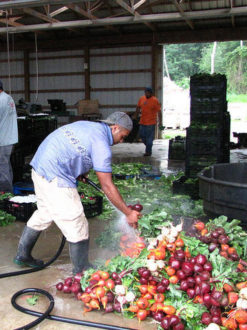
From farm to table, there are many points at which food can become unsafe for consumption. That is why farmers follow strict handling practices, as do those in charge of food processing, transportation, storage and delivery. Just like business management and marketing, even basic food safety benefits from having a strong plan in place so that everyone working on the farm, ranch or processing facility is familiar with required procedures. Here are some resources to help you navigate food safety topics, including methods to keep produce safe, and approaches to help processors maintain a safe environment and working with a food safety inspector.
Food Processing
Producers can earn extra income by selling value-added products—crops and animals processed to increase their value and earn additional income. From jams to cheese, customers are willing to pay more for finished products that they are not accustomed to making themselves. Adding value can range from post-harvest handling (e.g., cleaning, processing and packaging) to developing a convenience or finished product (e.g., flour, yogurt or pickled goods) to meat processing and packaging. Farmers are turning oilseeds into palatable oils and ranchers are adding value to their sheep operations by processing and selling yarn. Producers who want to market their vegetables to a school will often have better luck if they sell them pre-cut and packaged, which requires processing methods and equipment.
Small-scale, local livestock processing declined dramatically with intensification of the industry, but such processors are beginning to reappear as more livestock producers become interested in selling locally. Here we offer resources for people who want to build meat-processing facilities, including on-farm and mobile facilities. Once established, food processing can add profit for a farmer and provide convenience for consumers.
Farm to Table Video: Exploring Grass-Based Dairy
Strong Communities
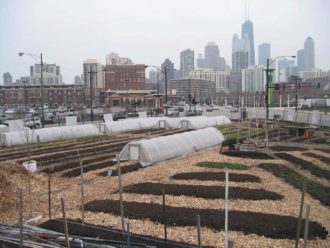
Many consumers are more eager to support local farmers when they perceive a social benefit to their community. This can take many shapes: Farmers can demonstrate fair treatment of farm labor, collaborate with schools on educational programs or reach out to low-income and underserved groups, to name a few approaches.
Conclusion
Local and regional food systems will continue to grow as consumers demand produce from their communities and establish stronger relationships with their local farmers and ranchers. Producers, community members, consumers, educators and many others will continue to be involved in developing functioning local food systems.
